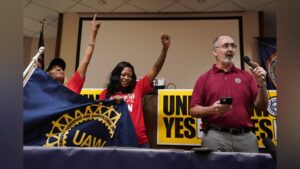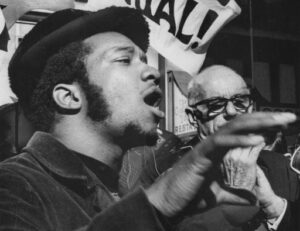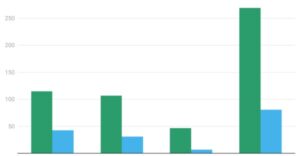In the wake of two unsuccessful presidential campaigns of Sen. Bernie Sanders, much of the U.S. left has become captive to the idea that socialism can be advanced through electoral campaigns—even if the candidates they support are Democrats like Rep. Alexandria Ocasio-Cortez, or recently elected Chicago Mayor Brandon Johnson.
While many of these forces say they are interested in building a party “of our own” or a party for working people distinct from the Democrats, invariably they push this goal into a distant future that never comes. And in this way, the Democratic Party harvests another generation of labor and social movement activists.
This was clearly not what Marx and Engels and other socialists in the Marxist tradition had in mind. To them, the fundamental role of working-class participation in politics was to establish a distinctive working-class politics embodied in its own candidates and organizations. These organizations were to draw a sharp line between themselves and other middle-class or bourgeois reformers. To them, elections and representation in parliament was not fundamentally aimed at pressing the ruling class to toss a few reforms to workers. On the contrary, electoral politics were an important means for the working-class to develop its own political organizations as part of the long-term struggle for socialism, or workers’ control of society.
In the first installment of this two-part article, Lance Selfa examines why socialists in the Marxist tradition argued for working-class political independence.
Frederick Engels, the co-author with Marx of The Communist Manifesto, once made the point that the struggle for socialism occurs on three levels: the economic, the political and the ideological. In the process of building a movement that can establish workers power, workers confront the bosses in all of those arenas.
It’s easiest to recognize the class struggle in the economic realm, where workers confront the bosses in strikes and protests. But the struggle for socialism is also a battle of ideas—ideas as to whether workers can or should control society, for instance—or combatting the “common sense” ideas of racism or sexism. And it’s a political battle, as the confrontation between workers and bosses, if it becomes large enough to go beyond a particular workplace or industry, but to take on a class-wide appeal, begins the raise the ultimate question of politics: Who controls society? Is it the workers or the bosses?
When Marx and Engels wrote in the Communist Manifesto that “the class struggle is a political struggle,” they didn’t mean that every conflict over wages and benefits raised political issues or control of society. As they refined their ideas, they proceeded from the assumption that as working-class organization developed, the movement would begin to raise its own demands because workers have interests as a class that are distinct from other classes or from some more general idea of the public good.
In a letter to a German socialist in the U.S., Marx wrote that a strike at one factory to force the boss to cut the workday was a purely economic fight. But if the working-class movement as a whole combined to demand an eight-hour day—even a law enforcing an eight-hour day—this would be a political movement. So, Marx wrote, out of these different economic movements, a political movement of the class would emerge, “with the object of enforcing its interests in a general form, in a form possessing general, socially coercive force. While these movements presuppose a certain degree of previous organization, they are in turn equally a means of developing this organization.”
It’s worth noting here that Marx saw a flow from economic struggle to a political struggle, and also saw how a political demand, such as the demand for the eight-hour day, could organize workers further. And Marx here is talking about some kind of organization—as he notes, spontaneous struggle only goes so far—and doesn’t work to organize workers with a conscious aim of winning some reform from the system.
Both implicitly and explicitly, when Marx and Engels talk about organizing the working class, they talk about organizing the working-class not only economically, but, more importantly, politically, as well. As Marx and Engels were actively organizing the First International at a time when trade unions, socialist groups and political parties were first taking shape, they were able to reflect on this experience.
The First International was a hybrid organization that included types of organizations that we don’t necessarily associate with being in the same formation—English trade unions, anarchist groups, and socialist political clubs. This hybrid formation was unstable and ultimately came unstuck. One of the main reasons for its demise the defection of the English trade union leaders to open political support of one of the main bourgeois political parties in Britain, the Liberals.
With this experience in mind, Engels wrote to a Spanish workers group, laying out what would become one of the main guiding points of Marxism about workers and politics:
Experience has everywhere proved that the best means of liberating the workers from this domination of the old parties is to found in each country a proletarian party with its own policy, a policy clearly distinguished from that of other parties, since it has to express the conditions of the emancipation of the working class. The details of this policy may vary according to the particular circumstances in each country…
There are several important takeaways from this point of Engels. First, that socialists should strive in every country to assert the independence of the working class from the capitalist class. This means not only fighting for independent trade unions (rather than company unions), but also fighting for independent political organizations and an independent class policy from the bourgeoisie and its political representatives. Second, that there were no pat formulas to be followed…that each working-class movement would have to make its way to political independence, and that socialists should help it to find that way.
In the U.S. today, we have still not achieved this goal. Two capitalist parties dominate the political landscape, and most of the labor movement and social movement organizations remain attached in one way or another to the Democratic Party.
When we say that the Democratic Party is a bourgeois party, it’s because no matter who votes for it—and the majority of Democratic voters are workers—the party apparatus itself is set up to reflect, and to some extent, organize, the political interests of the capitalist class. We all know the mechanisms by which this takes place: a campaign finance system that is set up channel corporate money to candidates; a network of business lobbies and think tanks that pressure Congress and produce pro-business “research”. These mechanisms work to keep both major U.S. political parties in the corporate fold, and a lot of this applies to both Democrats and Republicans.
This brief description of the Democratic Party should provide at least the negative argument for why workers need their own party. Because even in (or especially in) the “world’s greatest democracy” with the oldest continuously existing parliamentary party in the world, workers still are not politically represented in this country. Even the minimal recognition that labor has distinct interests and that it needs a vehicle to promote pro-worker reforms, as the existence of labor and social democratic parties in countries like Britain or Canada concedes, is missing in the U.S. Workers as a group or as a class have never been represented in the U.S. political system with their own political party, except for a few attempts at the formation of local labor parties and (possibly) the U.S. Socialist Party in Eugene Debs day. And this is one reason why the U.S. working class has still to win major demands, such as a national health care program, that every other working class in the advanced capitalist world has.
If the Democrats and other governing parties represent what most people think of when they think of political parties—and what we characterize as bourgeois or capitalist parties—what did Marx and Engels mean by a proletarian party? There is a sense in their earlier writings, like the Manifesto, that when they talk about “the Communists” or the “party of workers” that they’re talking about a current of opinion as opposed to an organization. In other cases, “the party” is sort of synonymous with the working-class movement. But we can’t forget the fact that Marx and Engels’ theoretical work in elaborating what they meant by working-class socialism was connected to building organizations to embody it.
By the mid-1800s and the founding of modern socialism, there’s nothing particularly unique about the idea of forming political organizations around a particular set of socialist ideas. Sections of the bourgeoisie had formed political clubs to campaign for their ideas in the French Revolution. As Marx said many times, he was not the first socialist. But he was the first to organize a political movement under the slogan that the First International adopted as its motto: “The emancipation of the working class is the act of the working class.” Not only did this set Marxist socialists apart from the Utopian socialists that came before Marx and Engels, but it also provided the grounds on which socialists organized to counter the influence of the anarchists of the time, led by the Russian Bakunin.
Many who today condemn Lenin for narrowing Marx’s ideas down to factional questions of party politics ignore the fact that for half a century, Marx and Engels argued for a particular kind of socialism and a particular approach to politics—contending with other forces on the left. The Communist Manifesto includes an entire section in which they contrast their ideas of socialism/communism to other common ideas on the left of that day. Marx and Engels did not develop the theory and practice of building socialist organization as deeply as Lenin did, but that’s not to say they weren’t willing to defend their conception of socialism against others.
Engels participated much more effectively in the construction of the Second International and played a formative role in the construction of what was to be the model socialist organization of the late 1800s/early 1900s—the German Social Democratic Party (SPD). This organization produced, after a period of illegality, dozens of newspapers, a mass membership, elected officials. Here you have mass political organizations that contended for political office, had political representation, led the trade unions and many of the civic associations. Engels was present during the rise of the early social-democratic parties across Europe. They organized in different countries with different strengths and weaknesses, but this was the model of socialist organization, and with it, the appearance of a united socialist movement internationally, under the Second International (1889-1916).
Engels observed—and criticized—early tendencies in these parties to accommodate to the capitalist status quo. When a trio of SPD leaders advocated moderating the party’s stance to make it more acceptable to the existing political system and to win non-proletarian votes, Engels blasted them in the Circular Letter of 1879. He accused them of attempting to show “clearly and convincingly that the red spectre really is just a spectre and doesn’t exist.”
And he ridiculed their insistence that they were acting within the bounds of socialist principle:
the party programme is not to be relinquished—but merely postponed—for some unspecified period. . . . They accept [the program]—not for themselves in their own lifetime, but posthumously, as an heirloom for their children and their children’s children. Meanwhile, they devote their ‘whole strength and energies’ to all sorts of trifles, tinkering away at the capitalist social order so that at least something should appear to be done without at the same time alarming the bourgeoisie.
Change a few words, and Engels’ argument could stand against a 21st century purveyor of the “dirty break”.
AUTHOR’S NOTE: Readers who are interested in this topic and Marx’s, Engels’ and Lenin’s writings should consult Hal Draper’s Karl Marx’s Theory of Revolution, Vol. II and August Nimtz’s The Ballot, the Streets or Both?
(A follow-up article will take up this more “modern” form of socialist political organization and how revolutionaries related to it.)
Lance Selfa is the author of The Democrats: A Critical History (Haymarket, 2012) and editor of U.S. Politics in an Age of Uncertainty: Essays on a New Reality (Haymarket, 2017).




